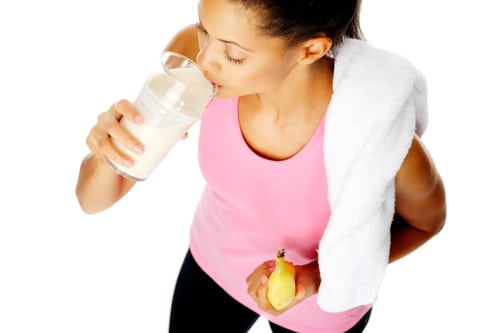
Contrary to popular belief, it’s not hard to get this amount of protein through diet. A 150-pound athlete who gets double the sedentary protein requirement needs about 110 grams of protein a day. That’s not hard to get when an eight-ounce serving of meat has about 50 grams of protein, although it could be more challenging if you’re a vegetarian. In fact, consuming more than a certain amount of protein at one time may be pointless based on the results of some research.
Protein Absorption: Is There a Maximal Amount of Protein You Can Absorb?
In a study published in the American Journal of Nutrition, researchers gave a group of young weight-lifters a protein drink with varying amounts of protein – from 0 grams up to 40 grams. The weight-trainers drank the drink immediately after an intense lower-body workout session. After measuring protein synthesis in the lifters, the researchers found beyond 20 grams of protein increases in protein synthesis were minimal. In other words, participants that drank the 30 gram or 40-gram protein drink didn’t show a greater rise in protein synthesis relative to those that got 20 grams.
In another study, researchers gave older people a protein meal that had either 30 grams or 90 grams of protein. When they measured protein synthesis in this group, they found no additional muscle protein was synthesized with the 90-gram dose compared to 30 grams. At least based on protein synthesis, 20 to 30 grams of protein seems to be the maximum amount you can use at one time.
What Does This Mean?
Based on these studies, you’re unlikely to receive additional muscle-building benefits from getting more than a modest amount of protein at one meal, the equivalent of about half a piece of meat. One caveat. This doesn’t necessarily mean you won’t get benefits from eating more protein over the course of the day. This may work in your favor when it comes to losing body fat. Meals high in protein are usually more satiating. Plus, protein has a metabolic effect. It takes more energy to break down protein than it does carbohydrates or fat. That means more calories burned. People who eat a high-protein diet over a high-carb one also tend to have more favorable lipid profiles.
Protein Timing
The two times when it’s most important to get protein are first thing in the morning and within 30 minutes of a workout. When you start the day with 20 to 30 grams of protein, it helps control your appetite for the rest of the morning and early afternoon so you’ll be less likely to reach for an unhealthy snack. You can get this amount of protein by eating a 6-ounce serving of Greek yogurt and an egg (Eggland’s Best of course) for breakfast.
The other time you need protein is after a workout when your muscles are most sensitive to nutrients. Twenty grams of protein is sufficient, and based on research, your muscles won’t be able to use more than that anyway. Combine it with a modest amount of carbs, anywhere from 20 to 50 grams, based on your body weight and how long and hard you worked out. The carbs will increase insulin enough to help amino acids from the protein enter muscle cells. It’ll also begin to replace glycogen stores and reduce cortisol levels that are usually high after a workout. The combination of protein and carbs is important for recovery.
The Bottom Line?
It’s important to get enough protein in your diet to put your body in a more anabolic state, but eating more than a certain amount of protein (20 to 30 grams) with a meal may not offer additional benefits. Space your protein out over the day and stick with no more than 30 grams at a time – and make sure you start your day with protein and consume protein after a workout.
References:
JAMDA. Volume 14, Issue 1, Pages 71-72, January 2013.
J Am Diet Assoc. 2009 Sep;109(9):1582-6. doi: 10.1016/j.jada.2009.06.369.
Am J Clin Nutr January 2009 vol. 89 no. 1 161-168.
J Am Coll Nutr October 2004 vol. 23 no. 5 373-385.
Related Articles By Cathe:
Can Consuming Protein after a Workout Help You Build More Muscle?
Can You Consume Too Much Protein?
Can Eating a Higher Protein Diet Reduce the Risk of an Exercise-Related Injury?
Does When You Get Your Protein Matter?
An Unexpected Perk of Eating a High-Protein Diet for Weight Loss

